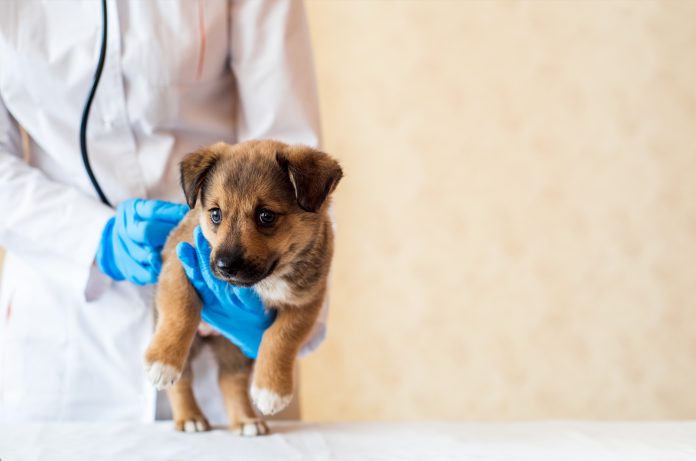Getting a puppy can go from “aww” to “wait what are these dog vaccination cards?” in 0.5 seconds. Dog vaccines are essential for your pooch to lead a comfortable, healthy lifestyle but most of the dog-parents have absolutely no clue about it. They hopelessly pay through their nose in exchange for high-priced, mostly ineffective, dog vaccination.
You just got to be a little aware, Linda! Dog vaccines may sound like a pug-ging big deal but they are just mutt ado about nawthing, honestly!
Now you’re going to say, “Hey wait, are you telling me that all those vaccination cards with alien names are not something to be scared about?”
Well, yes! You don’t really have to go into the technicalities of their names. A little idea of your puppy shot schedule and you are good to go.
It’s okay, Linda! We have your back. Let’s begin with the “what’s” and “why’s” for starters.
Table of Contents
What Is Dog Vaccination?
Dogs are like humans in every sense of being and so is their immune system. Dog vaccines prepare you little pooch to fight all the diseases that he might be prone to. Puppy shots contain antigens that imitate the disease-causing virus without actually causing the disease. It stimulates antibodies in the immune system by making it recognize the virus and thereby fighting it.
So, the next time a disease tries to attack your little baby, he will be fit to fight it back with strength because you took a responsible decision of following a proper puppy shot schedule.
Which Dog Vaccines Are Absolutely Necessary?
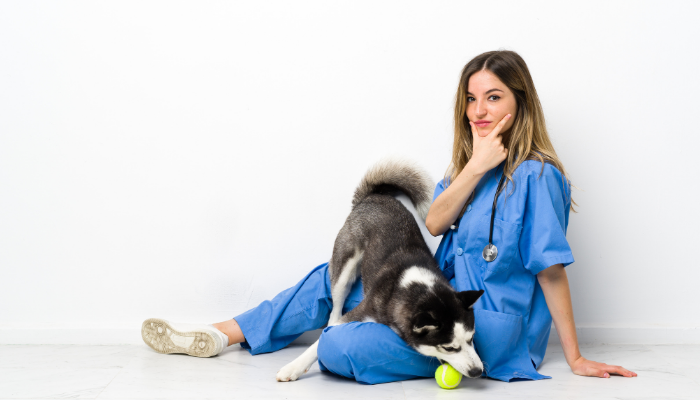
Dog vaccination is medically proven to prevent your puppy from any virus that can attack without suitable immunization. Which is why is it absolutely necessary to follow your dog vaccine schedule. Core dog vaccines are “must-haves” and should be given to every dog irrespective of his orientation, background, and medical history.
While talking about dog vaccination which are absolutely necessary, core dog vaccines are it.
Noncore dog vaccination on the other hand depends on:
- Age
- Medical History
- Environment
- Traveling Habits
- Lifestyle,
- and sometimes the Dog Group.
The myth is that the rabies dog vaccine is the ultimutt vaccination a puppy ever needs. Though getting rabies dog vaccine for your puppy has become a law in most parts of the world but that is not the only thing that your fido needs.
Dog Vaccination is of two types which are necessary for your pupper – core dog vaccines (required) and non-core (elective, based on lifestyle).
What are Core Dog Vaccines?
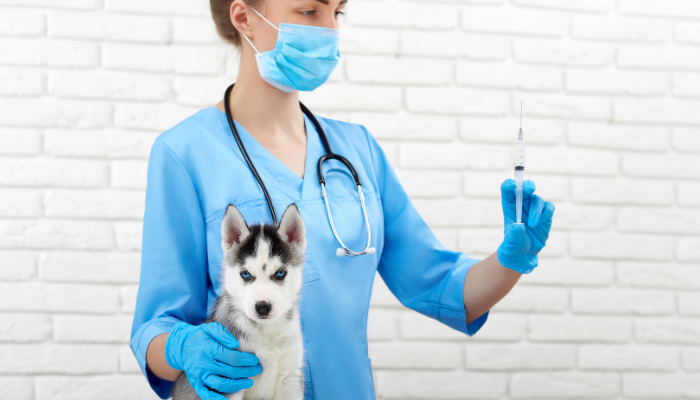
Core dog vaccines are the most important dog vaccination which is given to every puppy universally irrespective of their history to protect from the general spread of morbid diseases. Core dog vaccines are required and must be given to every puppy as per the puppy shot schedule but before we get into the schedule, let get a basic idea of what are these core dog vaccination and why are they necessary.
1. DA2PP (DHPP)
It’s just a little combination of all the necessary vaccines that your dog needs to protect himself from highly contagious diseases like:
A. Canine Distemper Vaccine fights a contagious virus, that affects the respiratory, gastrointestinal, and nervous system of puppies and can spread through coughing, sneezing, or sharing water and food bowls.
Symptoms may include:
Eye Discharge
Lethargy and Fever
Vomiting and Coughing
Circling, Head tilting, Seizures, and Paralysis
Hardening of Paw Pads
B. Canine Parvovirus attacks the gastrointestinal system causing bloody diarrhea, vomiting, and dehydration. It generally spread through contaminated feces and even the slightest remains on food bowl, leash or even human clothes can lead to this infection.
C. Adenovirus-2 (CAV-2) Vaccine fights a virus that leads to ‘kennel cough’ in dogs and attacks the respiratory system causing coughing, gagging fever, and nasal discharge.
D. Parainfluenza Vaccine is on the same lines are Adenovirus-2 and prevents a disease that causes ‘kennel cough’ resulting in coughing and respiratory disease.
2. Rabies Vaccine
Rabies is one of the most fatal diseases a dog can suffer through and it affect the nervous system directly. It can be lethal and mostly spreads from the saliva of an infected animal into the body of another animal (often through a bite) including humans. Dog vaccine rabies is often required by the law in most parts of the world. You check this out to know more about the laws for dog vaccination rabies in your state.
What you have to be careful about after getting your dog this shot is rabies vaccine side effects in dogs. Common rabies vaccine side effects in dogs would be anaphylaxis (basically rash, or low pulse), facial swelling, difficulty breathing, and hives.
There ain’t no first aid rabies vaccine side effects that would need you to rush to the vet for.
What Are Non-Core Dog Vaccines?
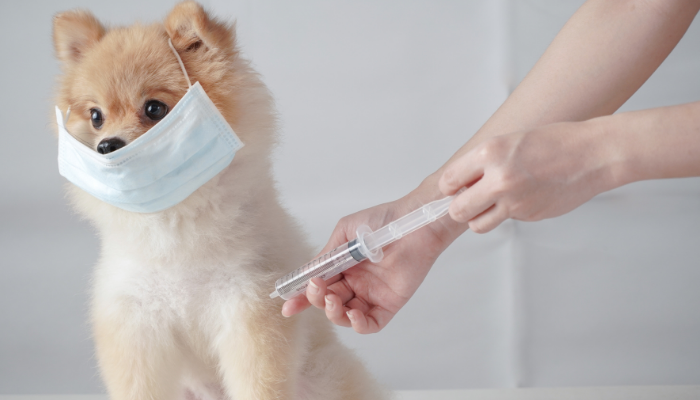
Non-core dog vaccines are optional vaccines that are taken on a lighter risk considering the geographical location, and lifestyle. Vets generally recommend these vaccines annually or triennially. Non-core vaccines are not included in the “must” group of dog vaccines for three foremost reasons:
- They hardly work that well.
- They hardly protect that well.
- They can have dangerous effects.
1. Bordetella Vaccine
Bordetella vaccine is a non-core vaccine that protects the pooch from a ‘kennel cough’. Bordetella carries a virus that can attack the respiratory system causing inflammation and discomfort. It is contagious and generally spreads in a large enclosed space, most likely kennels (that’s why the name).
If your dog is regular at dog parks, dog-creche, or training school, you can get him vaccinated but it does not give a hundred percent protection from Kennel Cough since other viruses can cause the same. It is very important to know the symptoms of Kennel Cough to be on the safer side (it’s curable, so thank god, for that!).
There are generally no side effects of Bordetella Vaccine but most of the vets do not recommend this to immunocompromised, pregnant, or sick doggos.
2. Leptospirosis Vaccine
Leptospirosis vaccine is given to dogs who have chances of being exposed to the leptospirosis virus that is carried by rodents, wildlife as well as livestock animals and majorly exist in dampness, still water or mud.
Leptospirosis can be found everywhere and is carried in the urine of cats, raccoons, skunks, and other animals. Generally, leptospirosis in dogs is contracted from swimming in contaminated or still water.
A zoonotic disease, spirochete bacteria is at its…
“My idea was to make this sound a little more layman.”
“I’d rephrase.”
Zoonotic as in, it is contagious to humans and this virus is present in the air…I should say, in the waters mostly during late summer, fall and of course during heavy rainfall. If your dog will be infected, the common leptospirosis symptoms in dogs would be fever, vomiting, diarrhea, muscle pain, or refusal to eat.
Leptospirosis vaccine is optional and you can give this shot only if your dog is exposed to such situation ns often. The vaccination may not prevent the disease but it can surely reduce the effects of infections. Some known leptospirosis vaccine symptoms in dogs would be anaphylaxis, lethargy, and possibly loss of appetite.
Leptospirosis is a non-core dog vaccine which is why the vaccine does not work, mostly.
3. Lyme Disease Vaccine
Lyme disease vaccination is given to dogs to prevent them from Lyme disease in dogs, more commonly known as a tick or tick fever. The tick gets infected by feeding on mice and other small animals and will enjoy a ride back home on your dog if your puppers loves sniffing bushes or running through tall grass. It is mainly transmitted by the deer tick and will be sucking the blooding outta your fido.
It is hurting and unlike the human tick, it just doesn’t want to die.
All bad things don’t want to die – Thanos and the Deer Tick.
It is very common in dogs to get affected by tick-fever and some can cause kidney damage or arthritis. Fleas in dogs can cause them a lot of pain and watching them down with swollen joints and fever can be heartbreaking.
“Don’t you worry child. See, heavens got a plan for you!”
Some cures can free your dog from symptoms and discomfort. Lyme disease treatment generally comprises of a series of antibiotics for weeks.
Lyme disease treatment cannot clear the bacteria but it sure does reach a state where there are no symptoms. If your pooch suffers from Kidney disease, you may want to rush to your pet.
Lyme disease vaccination is not required if your pooch is not exposed to such conditions. Adopting a regular dog grooming routine that is best for your pooch and getting a tick-collar should be enough.
There are no known Lyme disease dog vaccine reactions but your puppy may suffer through anaphylaxis, lethargy, and possibly loss of appetite.
4. Coronavirus Vaccine
Canine Coronavirus disease (not the Covid – 19 that has broken the world apart) is a virus that causes infection in the intestine majorly leading to diarrhea. It is generally brief but can have prolonged abdominal effects.
Coronavirus generally thrives in unsanitary and unkempt conditions that can lead to two-to-ten-days of illness. Though it is not a wide-spread disease, it is contagious and an infected dog can be a carrier for six months.
There is no treatment for coronavirus in dogs and antibiotics are mostly ineffective but may be given to curb secondary symptoms.
Vets will not give Canine Coronavirus Vaccine to a puppy initially and will only recommend it after assessing the risk factors and your dog’s lifestyle. Symptoms are unknown but Canine Coronavirus dog vaccine reactions may include anaphylaxis, lethargy, and possibly loss of appetite.
5. Giardia Vaccine
Giardia vaccine is a non-core dog vaccine that is given to prevent microscopic parasites leading to intestinal wall damage-causing foul-smelling diarrhea. Giardia infection may last for a few days and may result in reduced weight with symptoms like soft to watery stool with a greenish tint and occasional bleeding.
Giardia infection is not life-threatening unless your dog is immunocompromised, weak immune, and can be cured with antibiotics. However, giardia cysts may require cyst-removal surgery.
There are no given signs or dog vaccine reactions of Giardia Vaccine except anaphylaxis.
6. Canine Influenza Vaccine H3N8
Canine influenza, commonly known as the dog flu, is a transmissible disease that can cause respiratory infection. This virus is known to jump from one species to another. Though, we are not sure if Canine influenza is zoonotic (Don’t stare blankly, I have already given the meaning in the previous part of this article.) but it can definitely come from your crazy neighbor’s cat.
The Canine influenza symptoms in dogs generally look like cough, runny nose, lethargy, or mild fever. Generally, dogs recover within two to three days but sometimes secondary infections can lead to illness and pneumonia.
Canine Influenza Vaccine or the flu vaccine is relatively new in the field of dog vaccines and most vets do not recommend it for every dog. A non-core dog vaccine, the puppy shots will depend on a variety of reasons.
Puppy Shots Schedule
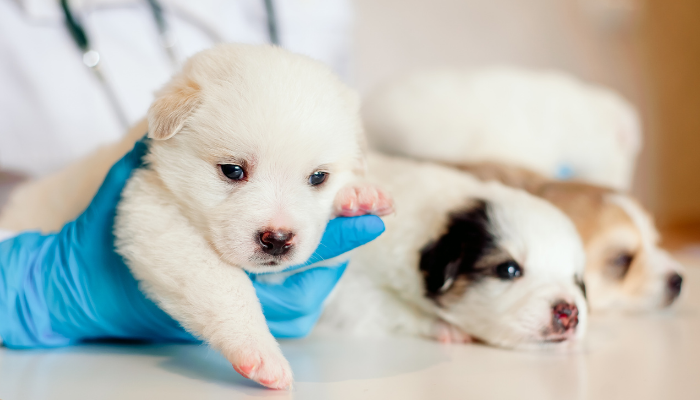
Puppy shots schedule is the first important step towards dog-parenting. As soon as you get your puppy home, with him you get a card – dog vaccination card. Puppy shot schedule starts as early as your puppy’s 6th week and is an ongoing responsibility till the 16th week.
“But how to go about it, Dhruti?”
Here’s your terror of dog vaccination resolved.
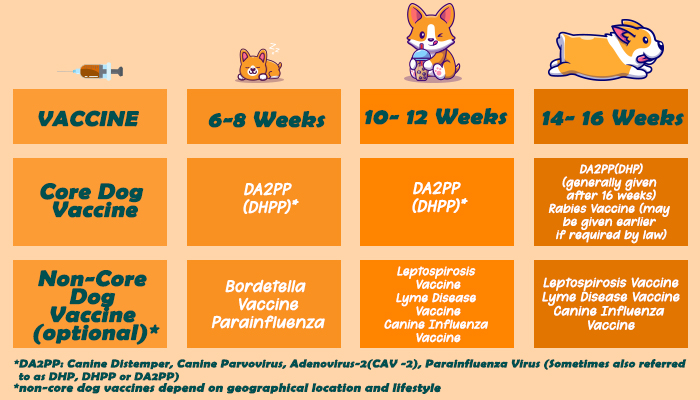
Note: Some puppies may need additional parvovirus vaccine after 15 weeks. Consult your dog’s vet for a proper schedule.
Dog Vaccine Schedule

The dog vaccine schedule is all the vaccinations you get your dog after the entire puppy shot schedule is done with. Alternatively known as boosters, dog vaccine schedules are shots that are generally given annually or triennially depending on the lifestyle and requirement of your doggo.
The general chart looks something like this:
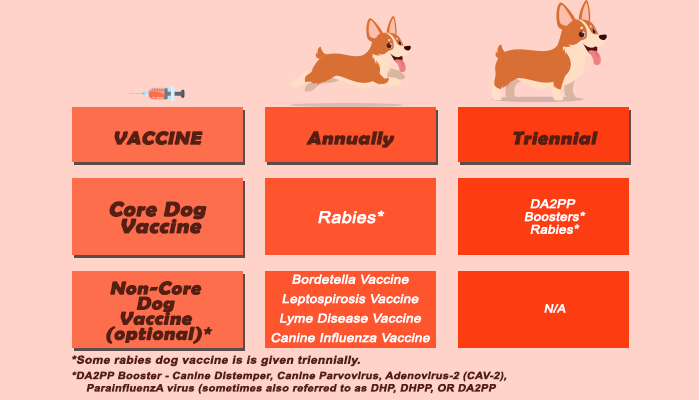
Cost Of Dog Vaccines
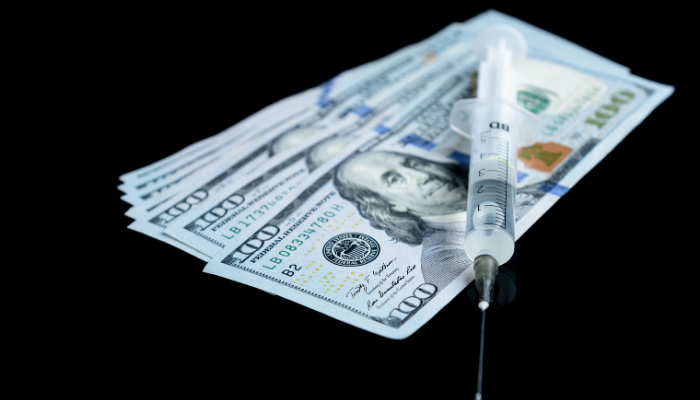
How much does a dog vaccination cost? Dog vaccination can haunt people not just because it is a tangent to most of our heads but also because dog health and care is costly. How much does a dog vaccination cost, after all?
The cost of dog vaccines depends on geographical location and the availability of puppy shots. However, according to AKC the average cost of dog vaccination can be anything from $75 to $100 (including the cost of core shots given over 6 weeks to 16 weeks). A shot of rabies vaccine will cost $12 to $20 depending on your area.
Low cost dog vaccines would be a dollar or two less than the actual price. An individual price of low cost dog vaccines would be:

Many animal shelters provide dog vaccines for free. You can also contact them if you are looking for low cost dog vaccines.
Common Dog Vaccines Reactions

There have hardly been any dog vaccines reactions apart from your fido coming to hate vet-days, there may be certain dog vaccines side effects due to immunization protocols. Some common dog vaccines reactions would be:
- Fever
- Loss of Appetite
- Anaphylaxis
- Pain and swelling around the injected area
- Diarrhea
- Lethargy,
- or Anaphylaxis shock (collapsing, seizure, or difficulty in breathing)
These dog vaccines reactions are less likely to appear and are short-lived. However, if you see major symptoms like anaphylaxis shock, facial swelling, or vomiting, you need to contact your vet immediately.
Puppy care is of utmost importance to which puppy shots and dog vaccination form a quintessential part. Your little buddy keeps his faith blindly in you, and you are expected to be a better and stable parent.
Over-Vaccinating Dogs: A Rising Concern
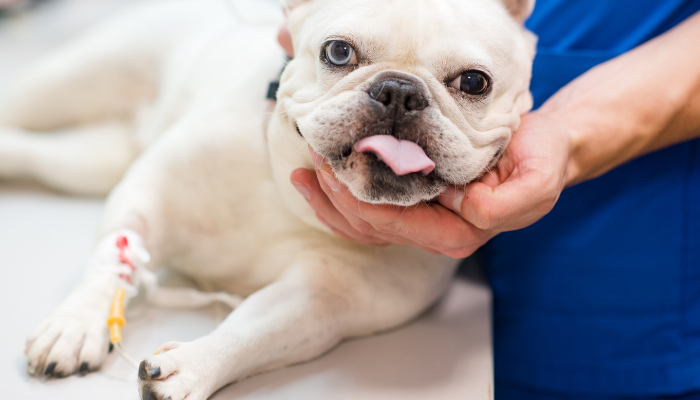
Do not over-vaccinate your dog! It has become a visible concern among dog parents who have experienced unnatural death due to over-vaccination dogs. Annual dog vaccination is not always necessary and it depends on the health and immunity of your baby. A lot of dogs have lived as fit as fiddle with just one round of core dog vaccines. Do not go around giving random combo shots– it’s like an assault on your dog’s immune system. Educate yourself about dog vaccination, have a thorough discussion with your dog’s vet, get a dog vaccine schedule tailor-made for your pooch, and stick to that.
Time to adult up and become one responsible mother-pupper!
Hello Readers!
Was this article too heavy on the head or was it well-informed?
Is your dog vaccinated?
Do you still have questions or concerns about dog vaccination?
Let us know everything in the comment section below.
Share this article on Whatsapp and Facebook to help dog parents who are clueless about Puppy Shots.
Subscribe to our YouTube channel and follow us on Instagram for more such paw-some content.
Happy Petting To You!



